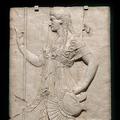006 Finis Priami
End of Priam|Priam's
006 Ende von Priamos
006 End of Priam
006 Fin de Príamo
006 Einde van Priamus
006 Fim de Príamo
006 Конец Приама
006 Кінець Пріама
Misera fortuna Priami, ultimi regis Troianorum, fuit.
Wretched|unfortunate fate|of Priam|last|"of the king"|"of the Trojans"|"was"
It is a miserable fate of Priam, the last king of the Trojan, has been.
Es un destino miserable de Príamo, el último rey de Troya, ha sido.
Il est un sort misérable de Priam, le dernier roi du cheval de Troie, a été.
トロイの木馬最後の王プリアモスの運命は悲惨でした。
Hostes, postquam dolo in urbem intraverunt, senex propulsabat.
The enemies|"after"|by trickery||the city|"entered"|old man|was driving away
Der alte Mann schlug die Feinde zurück, nachdem sie durch Täuschung in die Stadt eingedrungen waren.
The enemy, after deceit to enter the city, the old dispelled.
El enemigo, tras el engaño al entrar en la ciudad, lo viejo se disipó.
L'ennemi, après la tromperie pour entrer dans la ville, le vieux dissipés.
老人は敵がだまして町に入ってきたので撃退した。
Erat in media regia ara iuxtaque laurus, quae aram obumbrabat.
was||"in the middle"|royal palace|altar|"and next to"|laurel tree|"which" or "that"|altar|"was shading"
In der Mitte befand sich der königliche Altar und daneben der Lorbeer, der den Altar überschattete.
It was a laurel-tree and, near the altar of the in the middle of the palace, the altar of which are overshadowed.
Era un árbol de laurel y, cerca del altar del en el medio del palacio, el altar del cual están eclipsados.
中央には王の祭壇があり、その横には月桂樹が祭壇を覆い隠していました。
Hic uxor et filiae regis velut columbae tempestate ingenti fugatae fatum exspectant.
Here|wife||daughters|"of the king"|"like" or "as if"|doves|"by the storm"|great storm|"driven away"|fate or destiny|await
Hier erwarten die Frau und die Töchter des Königs ihr Schicksal wie von einem großen Sturm vertriebene Tauben.
The wife and daughter of the king will furnish great weather flight fate awaited.
La esposa y la hija del rey proporcionarán un gran clima de vuelo con el destino esperado.
ここで王の妻と娘たちは、大嵐に追い出された鳩のように運命を待っています。
Hinc Hecuba maritum revocabat.
"From here"|Hecuba|her husband|"was calling back"
Daher rief Hekabe ihren Mann zurück.
Hecuba, here she recalled.
Hécuba, aquí recordó.
そこでヘクバは夫のことを思い出した。
Frustra, inquit, patriam armis servare temptas: potius hic ad aram cum uxore et liberis deos implora!
"In vain"|he/she says|the homeland|with weapons|to save|"you attempt"|"Rather" or "instead"|here|to|altar||with his wife||with children|the gods|"implore the gods"
Vergeblich, sagt er, versuchst du, dein Land mit Waffen zu retten; flehe lieber die Götter hier am Altar mit deiner Frau und deinen Kindern an!
Are wasting your time, to keep the attempt to break your arms, country: rather, here is so with his wife, and their children to the altar of the gods to beseech him!
Están perdiendo su tiempo, para mantener el intento de romperse los brazos, patria: más bien, ¡aquí está así con su esposa, y sus hijos al altar de los dioses para suplicarle!
彼は、「あなたは武器で国を救おうとするのは無駄だ、むしろ、妻や子供たちとともにこの祭壇の前で神に懇願しなさい!」と言いました。
Senex verbis uxoris obtemperat.
the old man|"to the words"|wife's|"obeys"
Der alte Mann gehorcht den Worten seiner Frau.
An old man with a wife obeys.
老人は妻の言葉に従いました。
Ecce autem Polites, unus ex filiis Priami, saucius ad aram appropinquat et coram parentibus animam exspirat.
"Behold"|"however" or "moreover"|Polites|"one of"||sons of Priam|of Priam|wounded|||"approaches"||"in the presence"|"in front of parents"|soul|breathes his last
Siehe, Polites, einer der Söhne des Priamos, nähert sich dem Altar und stirbt im Beisein seiner Eltern.
Here, however, one of the sons of Priam wounded, was pulled closer to the front of my parents out.
見よ、プリアモスの息子の一人であるポリテスが祭壇に近づき、両親の見守る中で息を引き取る。
Post Politem advolat Pyrrhus, Achillis filius, qui miserum iuvenem vulneravit.Tum Priamus ira inflammatus exclamat: Impius es, Pyrrhe; nam patris os funere filii foedavisti; pater tuus non tam crudelis fuit in Priamum.
Pyrrhus attacks Polites|the city|"flies to"|cruel Pyrrhus|Achilles' son|son of Achilles|who|wretched young man|young man|wounded|"Then"|Priam|anger|inflamed with anger|exclaims|impious||Pyrrhus|||face|of the funeral|son|you have defiled|father|||so|cruel|||Priam
Pyrrhus, der Sohn des Achilles, fliegt Politus nach, der den armen Jüngling verwundet hat. Denn du hast des Vaters Mund befleckt durch die Beerdigung des Sohnes; Dein Vater war gegenüber Priamos nicht so grausam.
After the stone, flies, Pyrrhus, son of Achilles, the wrath of those who, inflamed with this wretched young man vulneravit.Tum When Priam, he exclaims: You are a wicked, Pyrrhus; For the funeral of his father mouth sullied; The father has not been so hasty in Priam.
アキレウスの息子ピュロスは、貧しい若者に傷を負わせたポリトスを追って飛んでいく。あなたは息子の埋葬によって父親の口を汚したからです。あなたの父親はプリアモスに対してそれほど残酷ではありませんでした。
Simul hostem ferro necare temptat, sed ipse a forti et crudeli iuvene obtruncatur.
|the enemy||to kill|attempts to||||brave||cruel|youth|is truncated
Gleichzeitig versucht er, den Feind mit einem Messer zu töten, wird jedoch selbst von einem starken und grausamen jungen Mann niedergestreckt.
At the same time tries to kill the enemy with the sword, but he himself is mighty men, and a cruel one, of the young man cut down.
同時に彼はナイフで敵を殺そうとしますが、彼自身も強くて残酷な若者によって切り倒されます。
Rex olim potens
king|once|powerful
King once powerful
かつては強大な王だった
iacet ingens litore truncus
lies huge on the shore|huge|on the shore|trunk
There lies a huge seashore
巨大な丸太が浜辺に横たわっている
avulsumque umeris caput et sine nomine corpus.
and torn off|shoulders||||name|
severed from the neck without a name.
そして肩から引き裂かれた頭と名前のない体。
(Publius Vergilius Maro: Aeneis)
Publius|Virgil|Virgil|Aeneid
(Virgil, Aeneid)
(プブリウス・ウェルギリウス・マロ:アエネイス)

